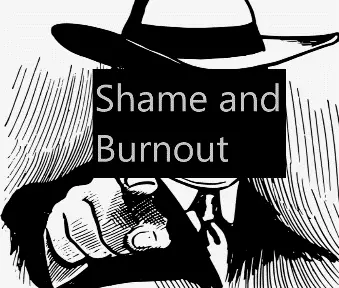Shame and the Physician Burnout Epidemic
Shame causes, exacerbates, and results from physician burnout.
Yet shame is rarely discussed as an underlying risk factor for burnout or as a result of burnout itself.
Pimping and other shame-based educational tactics have been understood in medical education for 50 years. Unfortunately, we fail younger physicians by inadequately addressing the “hidden curriculum” of undergraduate medical education. Shaming is common and promotes hierarchies, emotional isolation and dampens idealism.
If you feel shame (“I am bad”), you have an increased risk of burnout. Conversely, one can be shamed, which causes burnout. Finally, you can experience shame as a result of burnout.
Physician burnout causes shame, anxiety, and related maladaptive behaviors. Pre-existing shame is a risk factor for physician burnout.
Shame is common in medicine, and we need to talk about it.
Shame as a Cause of Physician Burnout
Shame and shaming. First, what is shaming?
Shaming is common in medicine. Medical education is an epidemic of silence, a burden of perfectionism, or a “hidden curriculum.” That this phenomenon cannot be named is a result of shame itself being shaming. We cannot even talk about it.
A physician’s education involves a large dose of shaming. Hazing is part of medical education. Is it worse than other professions? Yes, it is. In summary, shaming happens.
Next, feeling shame increases the risk of a young physician becoming burned out.
So, what is shame? Shame is an adaptive behavior that keeps us part of the tribe.
Guilt is “I did something bad.” You focus on the bad behavior. It is useful to keep cohesion in social circles.
Shame is, “I am bad.” It was not your behavior that was questionable. You are a bad person.
Shame hijacks the limbic system and causes shame spirals. When shame becomes maladaptive, you view it as a reason to escape instead of being a “bumper” to get you back in line with your peers. When injured recurrently, it makes sense to disengage and disassociate.
From there, it is a short hop to feeling like nothing you do matters, and you don’t matter.
How Common is Shame in Medical Education?
There are a few shame studies in medical education, mostly on shaming.
Students rarely, if ever, share stories of being shamed during their education. Once brought up, however, shaming during medical education is common. There are three main categories of shaming behavior: clinician behavior, suboptimal supervision, and disturbing interactions with patients and families.
As a result, the students commonly feel like dirt under someone’s shoes. They feel unacknowledged and insignificant. Other words that describe shaming include powerlessness, worthlessness, and a sense of smallness. Shame is visual rather than verbal. People want to disappear. They “go blank” or dissociate.
Interestingly, shame not infrequently leads to anger/rage as a self-protective response. The brain interprets shame as a crisis and activates the limbic fight or flight response. Ironically, shame self-isolates through a positive feedback loop, as avoidance prevents pain.
To get into medical school, you are apt to be the type that is susceptible to shame or situations that you encounter that are likely to promote shaming. Once there, the shaming will continue until the morale improves. Those prone to shame may have personality types that promote maladaptive shame-rage.
All that while 50% of physicians are significantly burnt out at some point.
How Can We Make Physicians More Shame-Resilient?
While avoiding discussions regarding the need for mass changes in the systems to prevent burnout in healthcare, we can try to address shame as a component of burnout.
How can we make physicians more shame-resilient?
Shame may be addressed with acknowledgment, open discussion, vulnerability, empathy, and self-empathy.
How to Mitigate Shame
While this is not intended as treatment advice, I am curious about the dime store recommendations for mitigating chronic shame. Ideas include:
- Acknowledge and be curious about your thoughts. I wonder why I’m feeling this way right now?
- Recognize your triggers. Avoidance or mitigation strategies may be useful.
- Challenge and reframe your thoughts. Is this true, or might something else be going on? Coaching may be helpful in this regard.
- Never let your trauma go to waste. Bring it to light and help others, if able. Or, through personal reflection, grow your resilience for the future.
- Practice compassion by loving yourself and accepting kindness from others.
Shame is seeing oneself as flawed relative to some ideal. You judge yourself unworthy in comparison.
Like dirt under the shoe, it can only be seen with light. We must discuss shame as a cause of burnout in medical education.
Shame is Common in Physicians
Shame stems from a lack of self-empathy.
Physicians, among the most empathetic humans, suffer from shame as commonly as addicts do. Shame is common in physicians.
Those attracted to medicine are at risk for shaming events during their pre-medical training. After all, they are highly accomplished, challenge-motivated people who may have developed some maladaptive traits while getting into medical school.
Have you ever seen a first-year medical student with maladaptive traits? Yes, rumor has it that it is common. Yet these are the most well-adapted folks who generally leave their medical training much worse for wear.
One way to disinfect shame is to open up and talk about it. Be curious. Ask questions: why do you feel that way, and is it possible that what you think might not actually be true?

